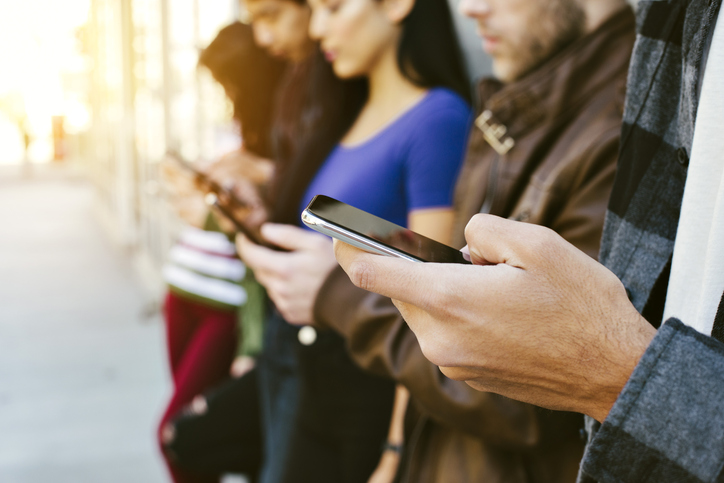A few years ago, I wrote about a new book we had come across called How to Break Up With Your Phone. I read the book and even adopted some of the principles from it. But, I fear, it is time for me to take a look again at the ways I use my smartphone.
A Typical Day
Since getting my first smartphone, it has increasingly become something I use more and more throughout the day (and night). I wake up in the morning and the first thing I do is check the time, then my texts/emails, then a couple of online stores that have daily deals I like to check in on. Then I check my bank account to see if the expected things have cleared. Next, I can be found in the bathroom taking care of business, while also checking in on social media to see what’s going on.
DING! I just got a notification. This one is from Target. It looks like there is a sale on women’s clothing today (I didn’t need to know that).
Time to get the kids to school. I’m checking for new email or texts at pretty much every stoplight. (I’m not as important as I’m acting like I am.) Drop the kids off at school, and start the latest audiobook I’ve been listening to. Arrive at work (checking my phone along the way).
DING! Another notification. It’s the vet this time, reminding me to bring in the dog.
Throughout the workday, I take little breaks between tasks to check all the same things again. Calendar. Email. Texts. Notifications. Social Media. Bank accounts. Sometimes I watch a TV show over my lunch break. The workday is wrapping up, so it’s time to head home. Audio book on. Check everything again and again (I’m on autopilot now).
Arrive home, begin making dinner using a recipe that it is (you guessed it) on my phone. Random thought comes to mind, “Who was that actor in that one movie from like 1983?” Search for answer on my phone. Sit down for dinner with the family. Try hard not to check anything on my phone while we are eating. Phone is in my pocket, but my watch is connected to it, so I buzz or ding in two places now. After dinner, we decide to watch a tv show together. Multitask by watching tv and checking all the same things on my phone AGAIN.
Time for bed now. I think I’ll read. An hour (or more later), I finally put down my phone (without reading that book) and try to sleep.
Sunday mornings at 9:00 am, I get a phone use notification: “Your screen time was up this week by 10% for an average of 7 hours per day.”
OH DEAR LORD!
I Think I Have a Problem
Don’t get me wrong here. Smartphones can be amazing tools. While there is plenty of garbage on the internet that I have no business looking at, there is also quite a bit that is good, even helpful. Really none of what I described above is bad, per se. For me, the problem is my lack of boundaries and the inability to say no. As someone who has struggled with addiction, I recognize the signs.
Some days, it seems the easiest solution would be to just get rid of my phone altogether. But in reality, that isn’t practical for me (it might work for you). Much like I need to learn how to have a healthy relationship with food, I need to work on a healthy relationship with my phone.
Some Helpful Tips
There are a few things that have stuck with me from my previous read through of Catherine Price’s How to Break Up with Your Phone. It is time for me to utilize those helpful tips again in my own life! She splits the book into two sections: The Wake-Up and The Break-Up. The Wake-Up includes some startling statistics about how our smartphones are affecting us, including how our brains are being changed. The Break-Up offers some helpful tips, beginning with paying attention to how and why you are using your smart phone. There are a number of steps to follow in this 30 day plan, which culminates with a two day trial separation from your smartphone.
Here are a few things I have found helpful. Some are from Price’s book and some are my own.
Make things more difficult
Part of what makes it so easy to spend so much time in smart-phone land is how easy they make things. Developers spend thousands and thousands of dollars making apps work seamlessly, betting that you will lose track of time and keep scrolling. One of Price’s steps is to remove many apps and access those sites via a web browser. Social media apps in particular do not work as well via a browser on your phone. You can still go there, but it requires more patience and work. This makes spending more time on Facebook less appealing.
Set limits for yourself
When I am checking my email obsessively, I am mostly seeing the same emails over and over. I am wasting brain power by seeing the same ones again. Scheduling a block of time to review emails and texts can be helpful, rather than gong back to those things repeatedly throughout the day. Some phones give you the option of setting actual time limits on your usage. This can be specific to different types of usage. For example, you could limit social media time to 1 hour per day, but still have access to other features you need.
Give your phone a bedtime
This one is so important. Designate a time that you put your phone on the charger outside of your bedroom or in an inconvenient place across the room. Actually do it! Get yourself a real alarm clock if you need, in stead of using your phone. You might read that book at night you have been meaning to read forever. Or have a conversation with your spouse. Or get a good night sleep, uninterrupted by your phone.
Wrapping Up
There are certainly consequences for being glued to your phone. For me, I want to be more present to my life that is happening right in front of me. I don’t want to look back on my life and realize that I could have been more engaged and connected with my loved ones, but I instead opted to check out on my phone (or any other ways we disengage).
Let’s try and be more present together.
If you’d like to check out How to Break Up with Your Phone, you can get a copy here.

Roger Jones
Executive Director
In the spring of 1995, the conflict Roger felt between his faith and his sexuality, as well as an addiction to pornography, led him to WGA. His personal journey has provided him unique insights into sexuality and the pain of adversity, which he shares through his testimony, facilitation of small groups, writing and public speaking.
Roger began working with WGA in October of 1996 as the Assistant office Manager. Since that time, he has worn many hats and served in several different positions, including Assistant Program Director and Operations Director. In April of 2007, Roger assumed the position of Executive Director.
Roger attended West Texas A&M University, where he studied Music Business. Much of his training has been “on the job,” where he was mentored by the ministry’s Founder, Mary Heathman, and the Program Director, Scott Kingry. He holds a BA from West Texas A&M University.
Roger, his wife Jill, and their daughter Julia and son William, attend Celebration Community Church where Jill serves as Senior Pastor.
Make a Difference in Someone's Life
If you enjoy reading WGA’s blogs and would like to show your support, please consider making a donation. Where Grace Abounds is a 501(c)3 non-profit organization. The majority of services, including support groups and discipleship counseling, are provided free of charge. Your financial gifts help to cover the costs associated with offering a free program to those who seek WGA’s services.

